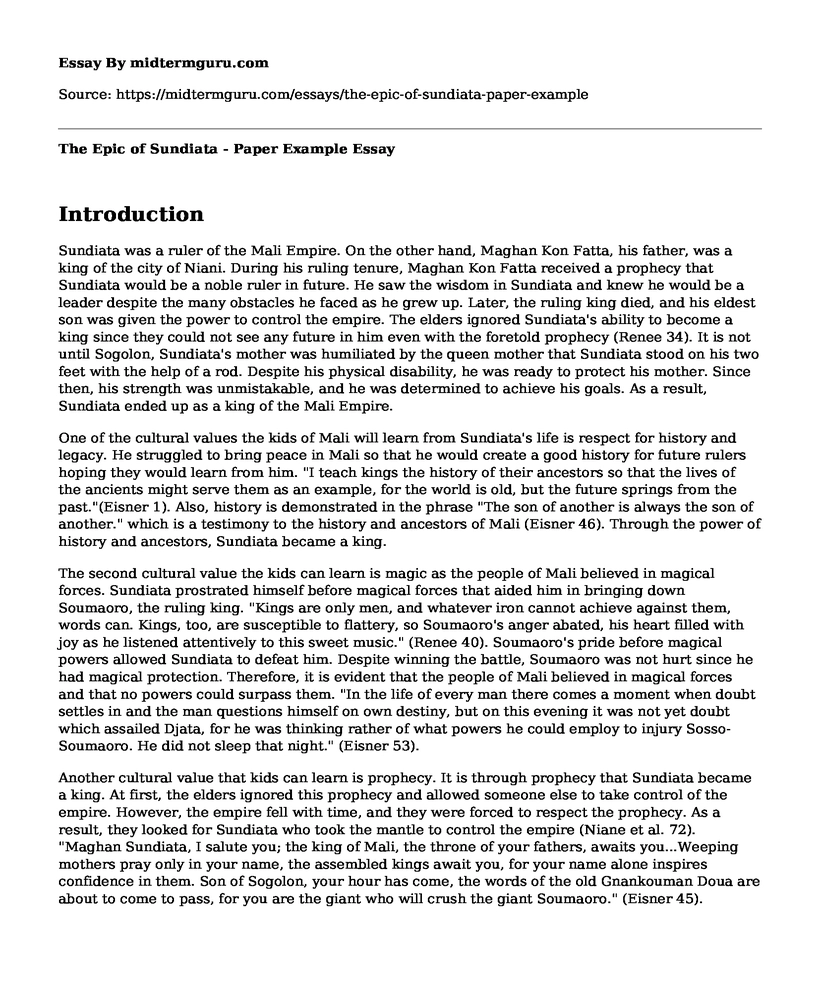Introduction
Sundiata was a ruler of the Mali Empire. On the other hand, Maghan Kon Fatta, his father, was a king of the city of Niani. During his ruling tenure, Maghan Kon Fatta received a prophecy that Sundiata would be a noble ruler in future. He saw the wisdom in Sundiata and knew he would be a leader despite the many obstacles he faced as he grew up. Later, the ruling king died, and his eldest son was given the power to control the empire. The elders ignored Sundiata's ability to become a king since they could not see any future in him even with the foretold prophecy (Renee 34). It is not until Sogolon, Sundiata's mother was humiliated by the queen mother that Sundiata stood on his two feet with the help of a rod. Despite his physical disability, he was ready to protect his mother. Since then, his strength was unmistakable, and he was determined to achieve his goals. As a result, Sundiata ended up as a king of the Mali Empire.
One of the cultural values the kids of Mali will learn from Sundiata's life is respect for history and legacy. He struggled to bring peace in Mali so that he would create a good history for future rulers hoping they would learn from him. "I teach kings the history of their ancestors so that the lives of the ancients might serve them as an example, for the world is old, but the future springs from the past."(Eisner 1). Also, history is demonstrated in the phrase "The son of another is always the son of another." which is a testimony to the history and ancestors of Mali (Eisner 46). Through the power of history and ancestors, Sundiata became a king.
The second cultural value the kids can learn is magic as the people of Mali believed in magical forces. Sundiata prostrated himself before magical forces that aided him in bringing down Soumaoro, the ruling king. "Kings are only men, and whatever iron cannot achieve against them, words can. Kings, too, are susceptible to flattery, so Soumaoro's anger abated, his heart filled with joy as he listened attentively to this sweet music." (Renee 40). Soumaoro's pride before magical powers allowed Sundiata to defeat him. Despite winning the battle, Soumaoro was not hurt since he had magical protection. Therefore, it is evident that the people of Mali believed in magical forces and that no powers could surpass them. "In the life of every man there comes a moment when doubt settles in and the man questions himself on own destiny, but on this evening it was not yet doubt which assailed Djata, for he was thinking rather of what powers he could employ to injury Sosso-Soumaoro. He did not sleep that night." (Eisner 53).
Another cultural value that kids can learn is prophecy. It is through prophecy that Sundiata became a king. At first, the elders ignored this prophecy and allowed someone else to take control of the empire. However, the empire fell with time, and they were forced to respect the prophecy. As a result, they looked for Sundiata who took the mantle to control the empire (Niane et al. 72). "Maghan Sundiata, I salute you; the king of Mali, the throne of your fathers, awaits you...Weeping mothers pray only in your name, the assembled kings await you, for your name alone inspires confidence in them. Son of Sogolon, your hour has come, the words of the old Gnankouman Doua are about to come to pass, for you are the giant who will crush the giant Soumaoro." (Eisner 45).
Conclusion
In conclusion, it is evident that Sundiata became a king since he was destined to. Even with challenges, he fulfilled the foretold prophecy. History, magic, and prophecy are some of the cultural values kids can learn from Sundiata's life. He used magical forces to attain his kinship since history dictated that he should be a ruler. Besides, we learn that prophecies have to be fulfilled even after a long period.
Works Cited
Cedars, S.R.. McKeever, Christine ed. "Sundiata: An Epic of Old Mali Quotes and Analysis". GradeSaver, 30 September 2012 Web. 7 November 2018.
Eisner, Will. Sundiata, the Lion of Mali: A Legend of Africa. New York: NBM, 2002.
Eisner, Will. Sundiata: A Legend of Africa. New York: NBM, 2003.
Niane, Djibril Tamsir, et al. Sundiata: An epic of old Mali. Longman Pub Group, 2006.
Renee, Baron. The Epic of Sundiata. , 2010.
Cite this page
The Epic of Sundiata - Paper Example. (2022, Sep 28). Retrieved from https://midtermguru.com/essays/the-epic-of-sundiata-paper-example
If you are the original author of this essay and no longer wish to have it published on the midtermguru.com website, please click below to request its removal:
- Soul by Soul Book Essay Example
- Essay Sample on Heroes in the Society
- Conspiracy Analysis on 9/11 Being an Inside Job
- Book Analysis Essay on Harriet Tubman: The Road to Freedom
- Movie Analysis Essay on I Am Not Your Negro
- Industrial Revolution: Advances and Challenges of the 18th-19th Century - Essay Sample
- The Cherokee Trail of Tears: Symbol of Callousness in American History - Essay Sample







